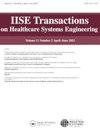通过医疗保险预防季节性流感爆发
IF 1.5
Q3 HEALTH CARE SCIENCES & SERVICES
IISE Transactions on Healthcare Systems Engineering
Pub Date : 2022-11-15
DOI:10.1080/24725579.2022.2145393
引用次数: 0
摘要
本文章由计算机程序翻译,如有差异,请以英文原文为准。
Prevention of Seasonal Influenza Outbreak via Healthcare Insurance
Abstract The outbreak of seasonal flu costs billions of dollars in health care utilization and lost productivity. Despite the effectiveness of vaccination and antiviral medications to prevent serious flu-related complications and slow down the spread of an influenza epidemic, only 52% of the U.S. population aged 6 months and older received flu vaccines in the 2019-20 flu season. In addition, a costly out-of-pocket expense results in fewer patients seeking treatment, leading to potential hospitalizations and even flu-related deaths. In this study, we develop an integrated healthcare insurance mechanism that optimizes two incentive policies, vaccination reward and cost-sharing, to alleviate the medical cost and disease burden while preventing the outbreak of seasonal influenza. We model the dynamic interaction between a single insurer and multiple insureds as a Stackelberg vaccination game; we then embed the game into an agent-based simulation to model the spread of flu in a population under different policies. Finally, we apply machine learning and simulation optimization to optimize healthcare incentive policies in a large-scale flu transmission simulation. Simulation results indicate that the proposed methodology efficiently identifies a set of good incentive policies under different scenarios of flu vaccine efficacy and reproduction numbers.
求助全文
通过发布文献求助,成功后即可免费获取论文全文。
去求助
来源期刊

IISE Transactions on Healthcare Systems Engineering
Social Sciences-Safety Research
CiteScore
3.10
自引率
0.00%
发文量
19
期刊介绍:
IISE Transactions on Healthcare Systems Engineering aims to foster the healthcare systems community by publishing high quality papers that have a strong methodological focus and direct applicability to healthcare systems. Published quarterly, the journal supports research that explores: · Healthcare Operations Management · Medical Decision Making · Socio-Technical Systems Analysis related to healthcare · Quality Engineering · Healthcare Informatics · Healthcare Policy We are looking forward to accepting submissions that document the development and use of industrial and systems engineering tools and techniques including: · Healthcare operations research · Healthcare statistics · Healthcare information systems · Healthcare work measurement · Human factors/ergonomics applied to healthcare systems Research that explores the integration of these tools and techniques with those from other engineering and medical disciplines are also featured. We encourage the submission of clinical notes, or practice notes, to show the impact of contributions that will be published. We also encourage authors to collect an impact statement from their clinical partners to show the impact of research in the clinical practices.
 求助内容:
求助内容: 应助结果提醒方式:
应助结果提醒方式:


